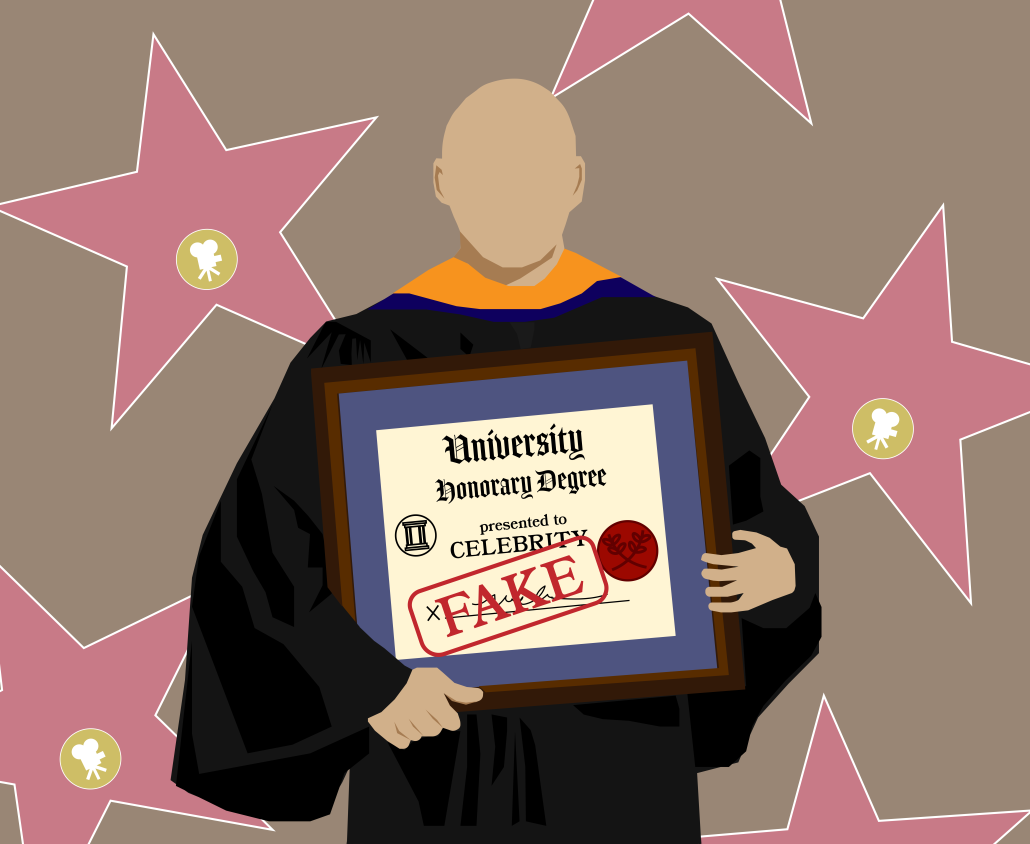Useless honorary degrees commemorate so-called ‘inclusion’

Every year, USC and other institutions across the United States award honorary doctorate degrees to individuals shaping the institution and academia. Although primarily useless, the degree is often tied to honoring renowned individuals who have transformed their field.
USC, however, has a long history of awarding these degrees to people who have accumulated power and capital — particularly when that capital and power has benefited USC. People such as billionaire and former CEO of software company Oracle, Larry Ellison, and ex-chief of the Los Angeles Police Department, Charlie Beck, were awarded these degrees in 2016 and 2018, respectively.
USC has continued this tradition in its 2022 graduation ceremony, honoring six people with degrees — four of whom are cisgender white men. Film producers Frank Price, Ron Howard and Brian Grazer were credited for their “efforts to expand industry inclusion,” and philanthropist David Bohnett was honored for “his commitment to ‘community building and social activism’” without further specification as to how any of them actually did so. Frank Price, as a member of the Board of Trustees, even approved his own honorary degree.
When investigating the three producers who were awarded with a degree, it seems that just about every film that put these producers on the map features an all-white cast and has no large contribution to the visibility of any one group or community. These white men did not contribute anything to inclusion in the industry. They merely tapped into it to serve their best interests.
Looking at USC’s Honorary Degrees website, if you search the words “transgender,” “disabled” or “first-gen” on USC’s past honorary degree recipients, you will find “no matches.” If you search “Black,” you will find just five matches; “Asian” and “Native” have one each; “Latino” or “Latinx” have zero. Sadly, if you’re a freshly admitted student looking for representation in USC’s traditions, you won’t find much.
While USC also honored two powerful women of color who broke endless barriers in their field this year, it was alongside four white men who did nothing for representation in their sphere of work, diluting the message.
Aside from the six people honored during commencement, USC also quietly made use of the degrees in correcting its problematic displacement of Japanese American students and their access to their USC education. Following the bombing of Pearl Harbor during World War II, former President Franklin Roosevelt’s 1942 Executive Order forced Japanese people living on the West Coast, including 120 first-generation Japanese American USC students, out of college and into internment camps. When the students returned to USC, the University not only denied them access to continue their degree plans but also prevented displaced students from gaining ownership of their college transcripts with hopes of transferring. Their education was indefinitely cut short on the basis of their ethnicity, and USC waited eight decades to acknowledge this relegation.
But what was this so-called “acknowledgment?” It was simply 33 honorary degrees that hold no power or purpose for the students and have no Universitywide recognition.
USC’s displacement of Nisei students from their education created generational barriers that continue to go unaddressed by substantive measures. The descendants of the displaced Japanese American students then became first-generation college students themselves, with no opportunities for their parents to finish the education that they had started. This created a series of new obstacles and barriers to education, especially at USC, which — considering undergraduate expenses alone — is set to cost $340,000 without scholarships or financial aid.
If USC and other institutions want to honor those who have supposedly bettered the world, they should put their money where their mouths are. They should stop celebrating white men under the guise of inclusion, and awardees should at least seek to create real change, for instance, funding full-tuition scholarships for financially burdened students who are making similar strides as the recipients in their community — for most honorees have more than enough resources to do so.
For the 33 Japanese students who were honored after their death, scholarships should be given to their children and grandchildren. These scholarships should be functional at any institution, debuting USC’s first pursuit of actually making education accessible — regardless of whether or not it benefits USC’s public image.
Without reform, USC’s flimsy honorary degrees will continue to perpetuate a white-centered, heteronormative and exclusive campus culture.

